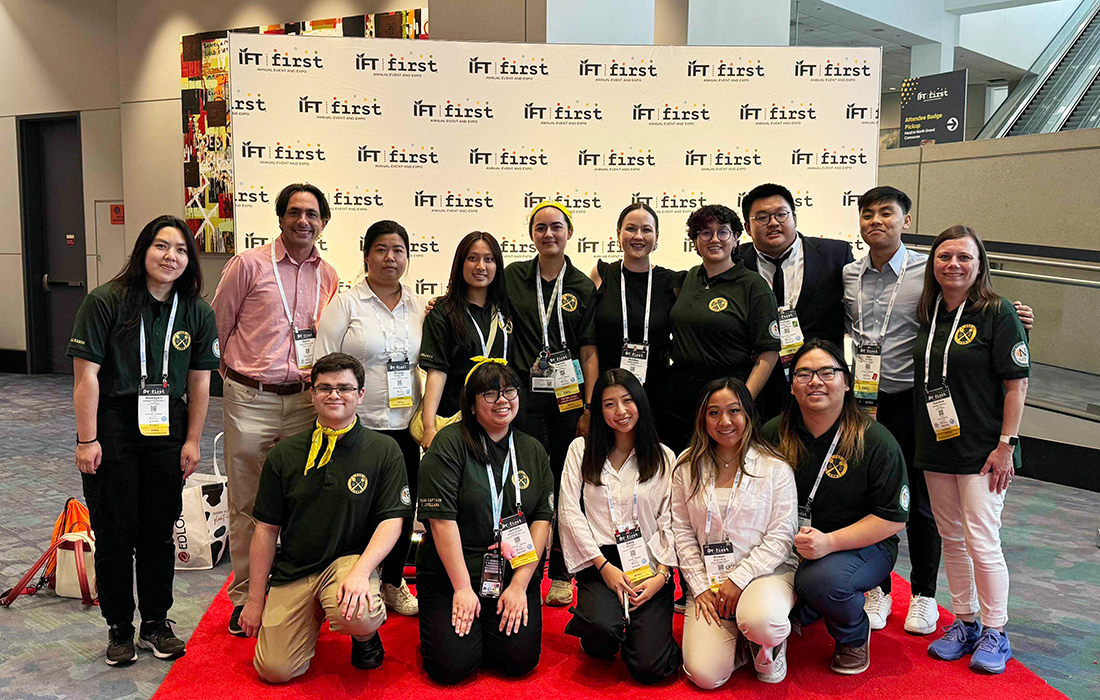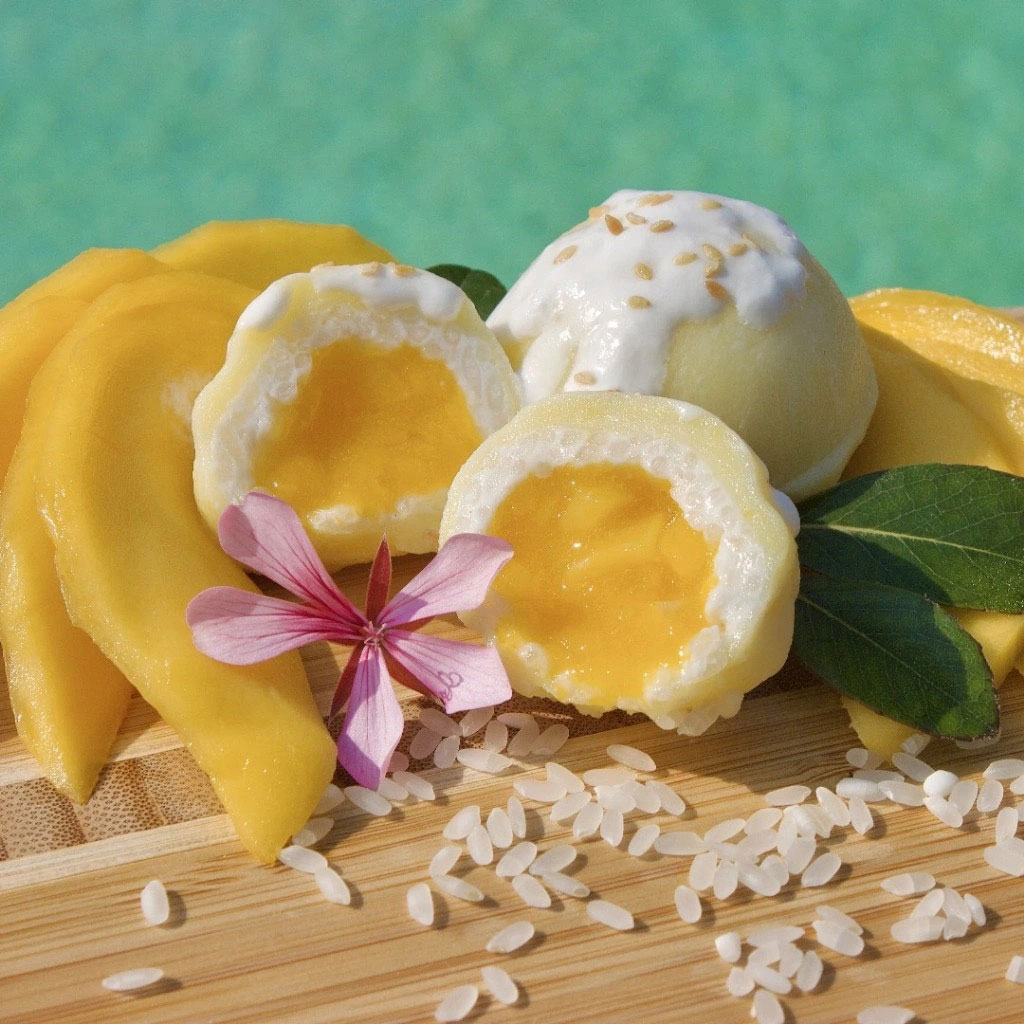CPP Students Find Recipe for Success at Food Competitions

Cal Poly Pomona students shone on a national stage in July at an intercollegiate food science and technology competition.
A team of seven undergraduate students took second place in the College Bowl competition at the Institute of Food Technologists (IFT) Food Improved by Research, Science, and Technology (FIRST) annual event and expo in Chicago.
The competition tested students’ knowledge of food science and technology, the history of foods and food processing, food law, and general food-related trivia.
The team included team captain Jeremie Javellana, Chun Choi, Estrella Mandujano, Alex Mathios, Camille McCurry, Nancy Siridachanon, and Jane Wangjaya. Lecturer Karoline Harrison was the team’s advisor/coach.
The Cal Poly Pomona students were competing against seven teams from larger universities, including Penn State University, The Ohio State University, Cornell University, University of Wisconsin, Brigham Young University, the University of Arkansas, and the University of Georgia.
The other teams were comprised mainly of graduate students. Cal Poly Pomona alumnus and IFT Student Association President-Elect Viral Shukla (’20, food science and technology) led the team from Cornell, where he is pursuing a doctorate in food processing waste.
Each of the teams made the finals by winning a regional competition.
The Cal Poly Pomona team beat out teams from Fresno State, Chapman University, Cal State Long Beach, and Cal Poly San Luis Obispo at the Pacific Southwest College Bowl. The regional contest was held at Cal Poly Pomona in March.
Product Development Contest
Another Cal Poly Pomona team took third place in the IFT Student Association & Mars Product Development Competition.
The contest challenges teams to develop a new food idea and carry the concept through marketing and production, like a commercial product development team.
The team of Estrella Mandujano Sanchez, Jane Wangjaya, Natalee Wolley, Shuting Chen, and Emily Byun decided to create a product for younger generations – Gen Z and millennials – who are health-conscious and enjoy indulging in unique, trendy products.
 The students made “Mango Sticky Bites,” an Asian fusion dessert inspired by two popular traditional Asian desserts, mango sticky rice and Daifuku, that they wanted to introduce to a broader audience.
The students made “Mango Sticky Bites,” an Asian fusion dessert inspired by two popular traditional Asian desserts, mango sticky rice and Daifuku, that they wanted to introduce to a broader audience.
Mango Sticky Bites included a mango gelée center containing real mango bits, surrounded by traditional Thai sticky rice with hints of coconut flavor, encapsulated in a thin layer of natural mango-flavored mochi, and served with a side of sweet, yet decadent, coconut sauce and toasted sesame seeds.
The dessert was gluten free, dairy free, vegan, and contained no genetically modified organisms (GMOs). In addition, its shape and bite-size nature made it travel friendly and convenient for consumers.
The students competed against teams from Cornell, the University of Florida, Chapman University, McGill University, and Oregon State.
The six teams were selected as finalists to compete in Chicago after submitting written proposals earlier this year.
For the final round, the team submitted another written proposal, gave an oral presentation, provided product samples, and defended its product concept to a panel of judges.
Judges evaluated each product based on its potential success in today’s market, safety/shelf-life criteria, originality, economic feasibility, marketing, sustainability, and technical problem-solving skills used in product development.
The team received $500 for its third-place finish.
The students were all part of FST 4290, the food product development course. Associate Professor Gabriel Davidov-Pardo and Lecturer Feng Xie were the team’s coaches/advisors.
Undergraduate Research Competition
Student Chun Choi took third place in the International Undergraduate Research Competition for his project, “Effect of Pre-Gelatinized Flour on Bread: Physical and Sensory Characteristics.”
The goal of Choi’s research was to determine the characteristics of bread made with different combinations of pre-gelatinized flour and consumer preferences among the combinations.
Choi was one of six finalists in the international competition, which featured students from the United States, Canada, Costa Rica, and Ghana.
During the final round, the students put on poster presentation that explained purpose of the work, research methodology and design, results, and conclusions.
Separately, they also gave a 10-minute oral presentation to judges, with an additional five minutes to answer any questions.
For his third-place finish, Choi received $500. His advisor was Davidov-Pardo.
IFT FIRST is billed as the largest global food science and innovation expo, bringing together researchers, scientists, engineers, and entrepreneurs from across the global food value chain.
It features more than 100 scientific sessions and discussions and more than 1,000 exhibitors showcasing new products, technologies and ingredients.

